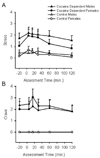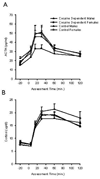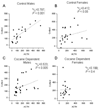Response to corticotropin-releasing hormone infusion in cocaine-dependent individuals
- PMID: 19349312
- PMCID: PMC2696287
- DOI: 10.1001/archgenpsychiatry.2009.9
Response to corticotropin-releasing hormone infusion in cocaine-dependent individuals
Abstract
Context: Corticotropin-releasing hormone (CRH), through the hypothalamic pituitary adrenal axis and other brain stress systems, is involved in the emotional dysregulation associated with cocaine dependence. Little is known about the response of cocaine-dependent individuals to CRH administration.
Objective: The primary objective was to examine the hypothalamic-pituitary-adrenal axis and the subjective and physiologic response to CRH in cocaine-dependent individuals and controls.
Design: A case-control study.
Setting: Subjects were admitted to a General Clinical Research Center for testing and abstinence was verified with a urine drug screening.
Participants: Participants were male controls (n = 23), female controls (n = 24), cocaine-dependent men (n = 28), and cocaine-dependent women (n = 25). Individuals with dependence on other substances (except caffeine or nicotine) or with major depression, posttraumatic stress disorder, bipolar disorder, or psychotic or eating disorders were excluded.
Intervention: Subjects received 1 microg/kg of CRH intravenously.
Main outcome measures: Primary outcomes included plasma corticotropin levels, cortisol levels, and heart rate and subjective measurements.
Results: Cocaine-dependent individuals exhibited higher stress (P < .001) and craving for CRH compared with controls. A positive correlation (r(s) = 0.51; P < .001) between stress and craving was found in cocaine-dependent subjects. Intravenous CRH elevated heart rates in all groups; however, cocaine-dependent women demonstrated a significantly higher heart rate at all time points (P = .05). Women had higher cortisol responses to CRH (P = .03). No effect of cocaine status was observed. The corticotropin response to CRH was independent of sex and cocaine dependence. Cortisol and corticotropin were positively correlated in the controls and cocaine-dependent men, but not in cocaine-dependent women (r(s) = 0.199; P = .4).
Conclusions: There is an increased subjective and heart rate response to CRH and a relationship between stress and craving in cocaine-dependent individuals. The lack of difference in hypothalamic pituitary adrenal axis response between the cocaine-dependent and control groups suggests that the heart rate and subjective responses in the cocaine group may be mediated by sensitization of nonhypothalamic stress-responsive CRH systems.
Figures





References
-
- Koob GF, Le Moal M. Drug addiction, dysregulation of reward, and allostasis. Neuropsychopharmacology. 2001;24(2):97–129. - PubMed
-
- Zhou Y, Spangler R, Ho A, Kreek MJ. Increased CRH mRNA levels in the rat amygdala during short-term withdrawal from chronic 'binge' cocaine. Brain Res Mol Brain Res. 2003;114(1):73–79. - PubMed
-
- Kuhn C, Francis R. Gender difference in cocaine-induced HPA axis activation. Neuropsychopharmacology. 1997;16(6):399–407. - PubMed
-
- Rivier C, Vale W. Cocaine stimulates adrenocorticotropin (ACTH) secretion through a corticotropin-releasing factor (CRF)-mediated mechanism. Brain Res. 1987;422(2):403–406. - PubMed
Publication types
MeSH terms
Substances
Grants and funding
LinkOut - more resources
Full Text Sources
Medical

